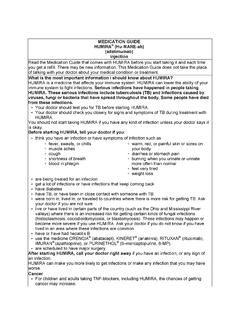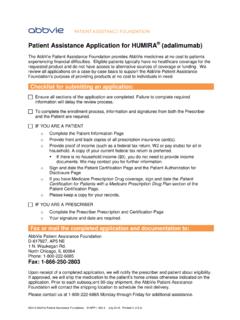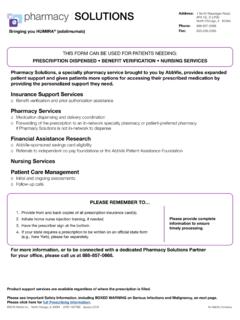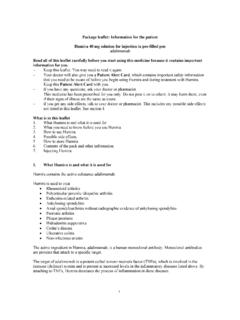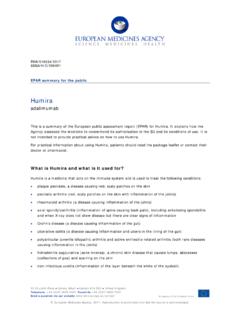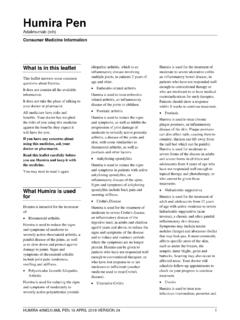Transcription of MEDICATION GUIDE - RxAbbVie
1 MEDICATION GUIDE . humira (Hu-MARE-ah). ( adalimumab ). injection Read the MEDICATION GUIDE that comes with humira before you start taking it and each time you get a refill. There may be new information. This MEDICATION GUIDE does not take the place of talking with your doctor about your medical condition or treatment. What is the most important information I should know about humira ? humira is a medicine that affects your immune system. humira can lower the ability of your immune system to fight infections. Serious infections have happened in people taking humira . These serious infections include tuberculosis (TB) and infections caused by viruses, fungi or bacteria that have spread throughout the body. Some people have died from these infections. Your doctor should test you for TB before starting humira . Your doctor should check you closely for signs and symptoms of TB during treatment with humira . You should not start taking humira if you have any kind of infection unless your doctor says it is okay.
2 Before starting humira , tell your doctor if you: think you have an infection or have symptoms of infection such as: fever, sweats, or chills warm, red, or painful skin or sores on muscle aches your body cough diarrhea or stomach pain shortness of breath burning when you urinate or urinate blood in phlegm more often than normal feel very tired weight loss are being treated for an infection get a lot of infections or have infections that keep coming back have diabetes have TB, or have been in close contact with someone with TB. were born in, lived in, or traveled to countries where there is more risk for getting TB. Ask your doctor if you are not sure. live or have lived in certain parts of the country (such as the Ohio and Mississippi River valleys) where there is an increased risk for getting certain kinds of fungal infections (histoplasmosis, coccidioidomycosis, or blastomycosis). These infections may happen or become more severe if you use humira . Ask your doctor if you do not know if you have lived in an area where these infections are common.
3 Have or have had hepatitis B. use the medicine ORENCIA (abatacept), KINERET (anakinra), RITUXAN (rituximab), IMURAN (azathioprine), or PURINETHOL (6 mercaptopurine, 6-MP). are scheduled to have major surgery After starting humira , call your doctor right away if you have an infection, or any sign of an infection. humira can make you more likely to get infections or make any infection that you may have worse. Cancer For children and adults taking TNF-blockers, including humira , the chances of getting cancer may increase. There have been cases of unusual cancers in children, teenagers, and young adults using TNF-blockers. People with RA, especially more serious RA, may have a higher chance for getting a kind of cancer called lymphoma. If you use TNF blockers including humira your chance of getting two types of skin cancer may increase (basal cell cancer and squamous cell cancer of the skin). These types of cancer are generally not life-threatening if treated. Tell your doctor if you have a bump or open sore that does not heal.
4 Some people receiving TNF blockers including humira developed a rare type of cancer called hepatosplenic T-cell lymphoma. This type of cancer often results in death. Most of these people were male teenagers or young men. Also, most people were being treated for Crohn's disease or ulcerative colitis with another medicine called IMURAN (azathioprine). or PURINETHOL (6-mercaptopurine, 6 MP). What is humira ? humira is a medicine called a Tumor Necrosis Factor (TNF) blocker. humira is used: To reduce the signs and symptoms of: moderate to severe rheumatoid arthritis (RA) in adults. humira can be used alone, with methotrexate, or with certain other medicines. moderate to severe polyarticular juvenile idiopathic arthritis (JIA) in children 2. years and older. humira can be used alone, with methotrexate, or with certain other medicines. psoriatic arthritis (PsA) in adults. humira can be used alone or with certain other medicines. ankylosing spondylitis (AS) in adults. moderate to severe Crohn's disease (CD) in adults when other treatments have not worked well enough.
5 Moderate to severe Crohn's disease (CD) in children 6 years and older when other treatments have not worked well enough. moderate to severe hidradenitis suppurativa (HS) in adults. In adults, to help get moderate to severe ulcerative colitis (UC) under control (induce remission) and keep it under control (sustain remission) when certain other medicines have not worked well enough. It is not known if humira is effective in people who stopped responding to or could not tolerate TNF-blocker medicines. To treat moderate to severe chronic (lasting a long time) plaque psoriasis (Ps) in adults who have the condition in many areas of their body and who may benefit from taking injections or pills (systemic therapy) or phototherapy (treatment using ultraviolet light alone or with pills). To treat non-infectious intermediate, posterior and panuveitis (UV) in adults. What should I tell my doctor before taking humira ? humira may not be right for you. Before starting humira , tell your doctor about all of your health conditions, including if you: have an infection.
6 See What is the most important information I should know about humira ? . have or have had cancer. have any numbness or tingling or have a disease that affects your nervous system such as multiple sclerosis or Guillain-Barr syndrome. have or had heart failure. have recently received or are scheduled to receive a vaccine. You may receive vaccines, except for live vaccines while using humira . Children should be brought up to date with all vaccines before starting humira . are allergic to rubber or latex. Tell your doctor if you have any allergies to rubber or latex. The needle cover for the humira Pen 40 mL, humira 40 mL prefilled syringe, humira 20 mL prefilled syringe, and humira 10 mL prefilled syringe may contain natural rubber or latex. The black needle cover for the humira Pen 80 mL, humira 80 mL. prefilled syringe, humira Pen 40 mL, humira 40 mL prefilled syringe, humira 20 mL prefilled syringe, humira 10 mL prefilled syringe and the vial stopper on the humira institutional use vial are not made with natural rubber or latex.
7 Are allergic to humira or to any of its ingredients. See the end of this MEDICATION GUIDE for a list of ingredients in humira . are pregnant or plan to become pregnant, breastfeeding or plan to breastfeed. You and your doctor should decide if you should take humira while you are pregnant or breastfeeding. have a baby and you were using humira during your pregnancy. Tell your baby's doctor before your baby receives any vaccines. Tell your doctor about all the medicines you take, including prescription and over-the- counter medicines, vitamins, and herbal supplements. Especially tell your doctor if you use: ORENCIA (abatacept), KINERET (anakinra), REMICADE (infliximab), ENBREL . (etanercept), CIMZIA (certolizumab pegol) or SIMPONI (golimumab), because you should not use humira while you are also using one of these medicines. RITUXAN (rituximab). Your doctor may not want to give you humira if you have received RITUXAN (rituximab) recently. IMURAN (azathioprine) or PURINETHOL (6 mercaptopurine, 6-MP).
8 Keep a list of your medicines with you to show your doctor and pharmacist each time you get a new medicine. How should I take humira ? humira is given by an injection under the skin. Your doctor will tell you how often to take an injection of humira . This is based on your condition to be treated. Do not inject humira more often than you were prescribed. See the Instructions for Use inside the carton for complete instructions for the right way to prepare and inject humira . Make sure you have been shown how to inject humira before you do it yourself. You can call your doctor or 1-800-4 humira (1-800-448-6472) if you have any questions about giving yourself an injection. Someone you know can also help you with your injection after they have been shown how to prepare and inject humira . Do not try to inject humira yourself until you have been shown the right way to give the injections. If your doctor decides that you or a caregiver may be able to give your injections of humira at home, you should receive training on the right way to prepare and inject humira .
9 Do not miss any doses of humira unless your doctor says it is okay. If you forget to take humira , inject a dose as soon as you remember. Then, take your next dose at your regular scheduled time. This will put you back on schedule. In case you are not sure when to inject humira , call your doctor or pharmacist. If you take more humira than you were told to take, call your doctor. What are the possible side effects of humira ? humira can cause serious side effects, including: See What is the most important information I should know about humira ? . Serious Infections. Your doctor will examine you for TB and perform a test to see if you have TB. If your doctor feels that you are at risk for TB, you may be treated with medicine for TB before you begin treatment with humira and during treatment with humira . Even if your TB test is negative your doctor should carefully monitor you for TB infections while you are taking humira . People who had a negative TB skin test before receiving humira have developed active TB.
10 Tell your doctor if you have any of the following symptoms while taking or after taking humira : cough that does not go away weight loss low grade fever loss of body fat and muscle (wasting). Hepatitis B infection in people who carry the virus in their blood. If you are a carrier of the hepatitis B virus (a virus that affects the liver), the virus can become active while you use humira . Your doctor should do blood tests before you start treatment, while you are using humira , and for several months after you stop treatment with humira . Tell your doctor if you have any of the following symptoms of a possible hepatitis B infection: muscle aches clay-colored bowel movements feel very tired fever dark urine chills skin or eyes look yellow stomach discomfort little or no appetite skin rash vomiting Allergic reactions. Allergic reactions can happen in people who use humira . Call your doctor or get medical help right away if you have any of these symptoms of a serious allergic reaction: hives swelling of your face, eyes, lips or mouth trouble breathing Nervous system problems.
